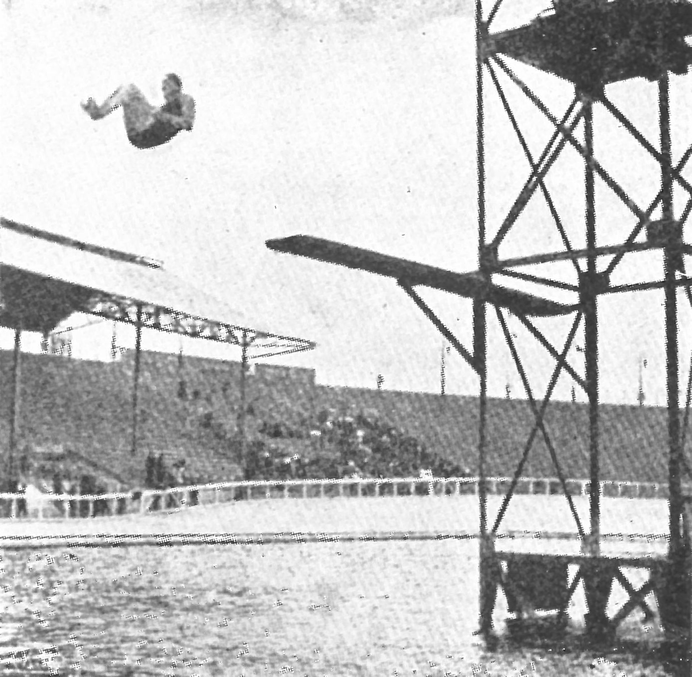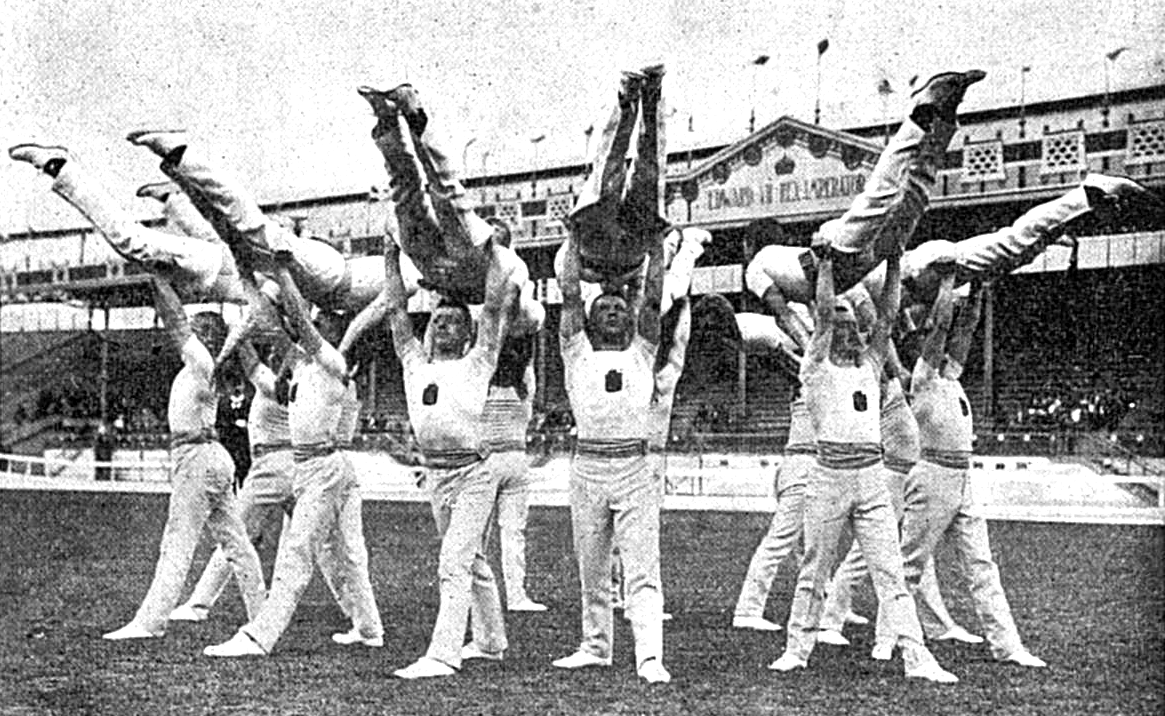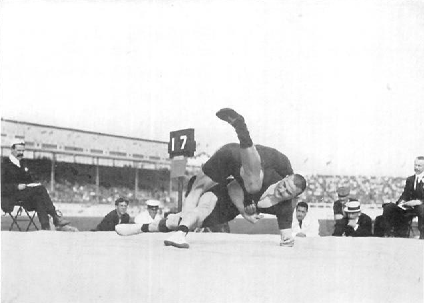Finland at the 1908 Summer Olympics on:
[Wikipedia]
[Google]
[Amazon]
Finland competed at the
 The Finnish divers had low expectations, as they had previously competed in plain jumps only, and their scores suffered from low degrees of difficulty. Valborg Florström performed a diving exhibition with Ebba Gisico of Sweden, which was the first appearance of women in the Olympic pool.
Results are lifted from:
*
The Finnish divers had low expectations, as they had previously competed in plain jumps only, and their scores suffered from low degrees of difficulty. Valborg Florström performed a diving exhibition with Ebba Gisico of Sweden, which was the first appearance of women in the Olympic pool.
Results are lifted from:
*
 Three groups of gymnasts travelled to the Games from Finland. The 26-man main group took part in the team event and 5 men in the individual artistic event.
Three groups of gymnasts travelled to the Games from Finland. The 26-man main group took part in the team event and 5 men in the individual artistic event.
 The Finnish shooting team performed poorly against expectations and returned in disgrace. The captain of the shooting team, Axel Fredrik Londen, explained in an article that the Finnish shooters could only afford an inferior number of practice shots and inferior gun powder. There also was an import ban on modern bullets and rifles in Finland.
The Finnish shooting team performed poorly against expectations and returned in disgrace. The captain of the shooting team, Axel Fredrik Londen, explained in an article that the Finnish shooters could only afford an inferior number of practice shots and inferior gun powder. There also was an import ban on modern bullets and rifles in Finland.
 Results are lifted from:
*
Ledend: W = win, L = loss, /f = by fall, /p by points
According to rumours, Weckman bribed Saarela to throw the light heavyweight final. Modern sportswriters Arto Teronen and Jouko Vuolle consider that there is plenty of circumstantial evidence in favour.
Results are lifted from:
*
Ledend: W = win, L = loss, /f = by fall, /p by points
According to rumours, Weckman bribed Saarela to throw the light heavyweight final. Modern sportswriters Arto Teronen and Jouko Vuolle consider that there is plenty of circumstantial evidence in favour.
Olympedia — Finland at the 1908 Summer Olympics
{{Nations at the 1908 Summer Olympics Nations at the 1908 Summer Olympics
Summer Olympic Games
The Summer Olympic Games (french: link=no, Jeux olympiques d'été), also known as the Games of the Olympiad, and often referred to as the Summer Olympics, is a major international multi-sport event normally held once every four years. The inau ...
for the first time at the 1908 Summer Olympics in London
London is the capital and largest city of England and the United Kingdom, with a population of just under 9 million. It stands on the River Thames in south-east England at the head of a estuary down to the North Sea, and has been a majo ...
, United Kingdom
The United Kingdom of Great Britain and Northern Ireland, commonly known as the United Kingdom (UK) or Britain, is a country in Europe, off the north-western coast of the continental mainland. It comprises England, Scotland, Wales and North ...
. The Grand Duchy of Finland
The Grand Duchy of Finland ( fi, Suomen suuriruhtinaskunta; sv, Storfurstendömet Finland; russian: Великое княжество Финляндское, , all of which literally translate as Grand Principality of Finland) was the predecessor ...
was part of the Russian Empire
The Russian Empire was an empire and the final period of the Russian monarchy from 1721 to 1917, ruling across large parts of Eurasia. It succeeded the Tsardom of Russia following the Treaty of Nystad, which ended the Great Northern War. ...
at the time, but Finland had become a sovereign member of the International Olympic Committee in 1907.
Medals
Verner Weckman
Johan Verner Weckman (26 July 1882 – 22 February 1968) was a wrestler, who is the first Finnish Olympic gold medalist.
Wrestling
He was inspired to take up wrestling at the age of 15. He joined the club Helsingfors Gymnastikklubben in 1902, ...
became the first Finn to win an Olympic gold. He had also been the first Finn to win a gold at the 1906 Intercalated Games
The 1906 Intercalated Games or 1906 Olympic Games was an international multi-sport event that was celebrated in Athens, Greece. They were at the time considered to be Olympic Games and were referred to as the "Second International Olympic Games i ...
.
Team
Aarne Salovaara and Johan Kemp competed in two sports, among 46 athletes in the games who competed in multiple sports. No women competed from Finland. However, Valborg Florström performed in a diving exhibition, which made her the first Finnish woman in the Olympics. Including non-competitors, the Finnish team had 73 athletes and 6 officials. Chef de Mission was Reinhold Felix von Willebrand. The Finnish Comité D'Honneur was Axel Fredrik Londen, Gösta Wasenius and Fred Hackman.Preparations
At the time,Grand Duchy of Finland
The Grand Duchy of Finland ( fi, Suomen suuriruhtinaskunta; sv, Storfurstendömet Finland; russian: Великое княжество Финляндское, , all of which literally translate as Grand Principality of Finland) was the predecessor ...
was not an independent country, but an autonomous part of the Russian Empire
The Russian Empire was an empire and the final period of the Russian monarchy from 1721 to 1917, ruling across large parts of Eurasia. It succeeded the Tsardom of Russia following the Treaty of Nystad, which ended the Great Northern War. ...
. However, Finns were qualified to take part independently as a sporting nation, which was a category recently devised by Pierre de Coubertin
Charles Pierre de Frédy, Baron de Coubertin (; born Pierre de Frédy; ...
, in an International Olympic Committee
The International Olympic Committee (IOC; french: link=no, Comité international olympique, ''CIO'') is a non-governmental sports organisation based in Lausanne, Switzerland. It is constituted in the form of an association under the Swiss ...
meeting in May 1907. Formal Finnish preparations for the 1908 Games had already began by then. In December, the Finnish Olympic Committee
The Finnish Olympic Committee ( fi, Suomen Olympiakomitea ry; sv, Finlands Olympiska Kommitté rf) is the national Olympic committee in Finland for the Olympic Games movement. It is a non-profit organisation that selects teams, and raises funds ...
was established, which budgeted 48,000 Finnish markka
The markka ( fi, markka; sv, mark; sign: Mk; ISO code: FIM, typically known outside Finland as the Finnish mark) was the currency of Finland from 1860 until 28 February 2002, when it ceased to be legal tender. The mark was divided into 100 pe ...
s (equal to about 200,000 euro
The euro ( symbol: €; code: EUR) is the official currency of 19 out of the member states of the European Union (EU). This group of states is known as the eurozone or, officially, the euro area, and includes about 340 million citizens . ...
s in 2018) for a team of 80 to be sent. Half of it was applied from the Senate of Finland
The Senate of Finland ( fi, Suomen senaatti, sv, Senaten för Finland) combined the functions of cabinet and supreme court in the Grand Duchy of Finland from 1816 to 1917 and in the independent Finland from 1917 to 1918.
The body that would beco ...
, who eventually granted only 8,000 markkas (30,000 €). By June 1908, a further 22,000 markkas (90,000 €) had been raised by various means.
The Finnish Olympic team was mostly selected by trials arranged in the spring of 1908. A few had to be replaced, when gymnastics teachers were defined as professionals.
Most of the Finnish team departed Helsinki aboard steamer ''Polaris'' on 7 July 1908. The shooting team had departed on 1 July, and wrestler Verner Weckman travelled independently from Berlin.
Opening ceremony controversies
''Polaris'' arrived in Hull on 13 July, the day of the opening ceremony, late due to a machine breakdown. A train took them to London, where they went directly from the station to the stadium. The hosts penalized the Finnish tardiness by having them enter the stadium last in the Parade of Nations, instead of their alphabetical position. A further problem was caused by their flag. There was no officialflag of Finland
The flag of Finland ( fi, Suomen lippu, sv, Finlands flagga), also called ' ("Blue Cross Flag"), dates from the beginning of the 20th century. On a white background, it features a blue Nordic cross, which represents Christianity.
The state ...
at the time, but they had brought three options, one of which represented the coat of arms of Finland
The coat of arms of Finland is a crowned lion on a red field, the right foreleg replaced with an armoured human arm brandishing a sword, trampling on a sabre with the hindpaws. The coat of arms was originally created around the year 1580.
Back ...
, the other two bearing the texts "Finlandia" and "Suomi-Finland". However, none of them was allowed, and the flag bearer Bruno Zilliacus carried a mere cardboard text plaque "Finland" that was borrowed from their dressing room door.
Contemporary assessment
The popular opinion in Finland of the overall athletic success of their Olympic team was meager, considering its numbers. Finnish sports leaders judged the Olympic participation to have been merely an expensive excursion, and pointed out two principal problems. First was an undisciplined and immoral tourist mindset among the team, which manifested as partying, smoking cigarettes and drinking alcohol. Second was a poor organization for the Games, which included a belated preparation only months in advance; minimal equipment for the team, such as bringing only one javelin; and having no professional coaching.Athletics
Finland's best result wasVerner Järvinen
Venne "Verner" Järvinen (3 April 1870 – 31 January 1941) was a Finnish track and field athlete, who competed mostly in throwing events. He won the gold medal in the Greek-style discus in the 1906 Intercalated Games, and the bronze in the 1908 ...
's bronze medal in the Greek-style discus throw. The athletics team generally performed up to expectations. Only javelin throw was considered a let down.
Unless otherwise specified, results are lifted from:
*
Track and road events
Notes:Field events
Notes:Diving
 The Finnish divers had low expectations, as they had previously competed in plain jumps only, and their scores suffered from low degrees of difficulty. Valborg Florström performed a diving exhibition with Ebba Gisico of Sweden, which was the first appearance of women in the Olympic pool.
Results are lifted from:
*
The Finnish divers had low expectations, as they had previously competed in plain jumps only, and their scores suffered from low degrees of difficulty. Valborg Florström performed a diving exhibition with Ebba Gisico of Sweden, which was the first appearance of women in the Olympic pool.
Results are lifted from:
*
Gymnastics
 Three groups of gymnasts travelled to the Games from Finland. The 26-man main group took part in the team event and 5 men in the individual artistic event.
Three groups of gymnasts travelled to the Games from Finland. The 26-man main group took part in the team event and 5 men in the individual artistic event. Viipurin Reipas
Viipurin Reipas was an ice hockey club based in Viipuri (Vyborg). Its ice hockey section was established in 1928. It played in the SM-Sarja for two seasons (1928 and 1932)
Reipas was one of the six first hockey teams that played in the first Fin ...
also sent an exhibition team. The Finnish overall result was considered satisfactory.
Shooting
Rifle
 The Finnish shooting team performed poorly against expectations and returned in disgrace. The captain of the shooting team, Axel Fredrik Londen, explained in an article that the Finnish shooters could only afford an inferior number of practice shots and inferior gun powder. There also was an import ban on modern bullets and rifles in Finland.
The Finnish shooting team performed poorly against expectations and returned in disgrace. The captain of the shooting team, Axel Fredrik Londen, explained in an article that the Finnish shooters could only afford an inferior number of practice shots and inferior gun powder. There also was an import ban on modern bullets and rifles in Finland. Lauri Kolho
Lauri Kolho (born Saxberg, 7 September 1886 – 17 September 1940) was a Finnish sports shooter, who competed at the 1908 and the 1912 Summer Olympics.
Shooting
Kolho was a board member of the Finnish Shooting Sport Federation in 1922– ...
blamed the fiasco on antiquated gun powder and bullets further impaired by a strong crosswind.
Results are lifted from:
*
Trap
Sources differ on the Finnish participation in the trap event: * In the ''Official Report'' of the 1908 Olympics (published in 1909), the three Finns are listed among 61 entrants to thetrap
A trap is a mechanical device used to capture or restrain an animal for purposes such as hunting, pest control, or ecological research.
Trap or TRAP may also refer to:
Art and entertainment Films and television
* ''Trap'' (2015 film), Fil ...
event. It then details the results for 28 shooters that reached the second stage, implying the Finns were eliminated in the first stage.
* Bill Mallon
William James Mallon (born February 2, 1952) is an American orthopedic surgeon, former professional golfer and a leading authority on the history of the Olympic Games.
Golf career
Born in Paterson, New Jersey, Mallon studied at Duke Universit ...
and Ian Buchanan in modern research of the 1908 Olympics (2000) argue that out of the 61 entrants, only about 31 started, all of whom were allowed to advance to the second stage, and the Finns never started the event.
* In a contemporary article (1908), Londen describes himself being at the Games in team leader's form, the Finnish shooters entering rifle events only and never mentions Huber or Fazer.
* The centennial history of the Finnish Olympic Committee (2007) lists Londen as a competitor who was eliminated in the first round without Fazer and Huber.
* The centennial history of the Finnish Shooting Sport Federation
The Finnish Shooting Sport Federation, ''Finnish'' Suomen Ampumaurheiluliitto (SAL), was founded in 1919 and is an umbrella organization for sport shooting in Finland, representing many international shooting sport organizations in Finland.
SAL ...
(2019) considers Fazer and Huber to not have started the event and Londen eliminated in the first round.
Swimming
The Finnish swimmers had low expectations and took the games as an excursion. They skipped the freestyle events and competed for the first time in backstroke. Also, they were used to a 25 metre track, but the Olympic pool was 100 metres long, which hindered them in their main event, the breaststroke. Unless otherwise specified, results are lifted from: *Wrestling
 Results are lifted from:
*
Ledend: W = win, L = loss, /f = by fall, /p by points
According to rumours, Weckman bribed Saarela to throw the light heavyweight final. Modern sportswriters Arto Teronen and Jouko Vuolle consider that there is plenty of circumstantial evidence in favour.
Results are lifted from:
*
Ledend: W = win, L = loss, /f = by fall, /p by points
According to rumours, Weckman bribed Saarela to throw the light heavyweight final. Modern sportswriters Arto Teronen and Jouko Vuolle consider that there is plenty of circumstantial evidence in favour.
Sources
*References
External links
Olympedia — Finland at the 1908 Summer Olympics
{{Nations at the 1908 Summer Olympics Nations at the 1908 Summer Olympics
1908
Events
January
* January 1 – The British ''Nimrod'' Expedition led by Ernest Shackleton sets sail from New Zealand on the ''Nimrod'' for Antarctica.
* January 3 – A total solar eclipse is visible in the Pacific Ocean, and is the 46 ...
Olympics
The modern Olympic Games or Olympics (french: link=no, Jeux olympiques) are the leading international sporting events featuring summer and winter sports competitions in which thousands of athletes from around the world participate in a var ...